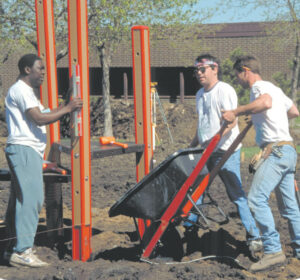Only Matthew tells Sunday’s parable, the first of three set in vineyards. The prophets Isaiah and Jeremiah and Psalm 80 imagine the people of Israel as God’s vineyard, a metaphor the gospel writers apply to the Christian community. Like vines that take root, grow, and become fruitful over many years, people and communities of faith live, change, and bear fruit. Like vines, communities of believers need care and cultivation to flourish.
Matthew 19, the chapter preceding Sunday’s parable about vineyard workers, touches on matters of status in the Christian community—the legality of divorce, the place of children, the status of those who keep the commandments, the possibility of the rich entering heaven, the status of those who leave all possessions to follow Jesus. The saying, “Many who are first will be last and the last will be first,” concludes this chapter (19.30).
Twice more Matthew repeats this message—at the end of Sunday’s gospel and later in chapter 20 when the question comes up of who will sit at Jesus’ right and left hand in his messianic kingdom. Jesus insists, “Whoever wants to be first among you must be your slave” (20.27). Matthew is at work calling the prosperous in his community to reorder their assets toward the poor, to conceive a more egalitarian order for the Church community than that in the social world of his time.
- What do you think makes a person first or last in our society? In Jesus eyes?
The hiring part of Sunday’s parable values work in the vineyard over idleness in the marketplace. Throughout the day the householder transforms the idle into active workers.
The parable emphasizes that the householder hires the first workers for the full, 12-hour day at the usual daily wage, one denarius. To the workers who begin at nine, the owner promises what is just. At this point in the parable Matthew characteristically begins to summarize. The householder does the same hiring at noon, three, and five.
This is the proportion of idle hours to work hours, indexed by hiring time.
6 A.M.: Idle 0 hours; work 12.
9 A.M.: Idle 3 hours; work 9.
Noon: Idle 6 hours; work 6.
3 P.M.: Idle 9 hours; work 3.
5 P.M.: Idle 11 hours; work 1.

When the last workers hired become the first workers paid, the householder demonstrates the new ordering in his house. The last receive a full day’s wage.
Immediately, the first hired have hopes of higher pay than they agreed to at their hiring. They reason that a worker ought to receive pay proportional to hours of work or amount of work completed. When the owner pays the last workers a full day’s wage, he establishes a whole new pay scale that will boost their earnings.
When the first workers receive their denarius, they remind the vineyard owner that they bore the burden of the day and its scorching heat. They want more than the last workers. Finding out someone’s salary unfailingly sets most of us to calculating what our own worth ought to be in relation to the other person.
- What would you say to the generous vineyard owner?
- When have you received more than you deserve?
When the householder pays the 11th-hour workers a full day’s wage, he reorients the parable. It is no longer about the wages workers deserve but about the householder’s generosity and a Christian social order.
The vineyard owner pays the full-day wage, the amount workers hope to make each day, even to those who don’t find work until the last hour. In effect, he shows a preferential option for the last, for the poorest. This is a basic principle in liberation theology.
The householder’s largesse invites us to ponder who this employer really is. As an image of God the householder is not transcendent and distant. The householder repeatedly seeks workers in the marketplace and cares enough about their well-being to pay them all the living wage.
The householder doesn’t blame those standing idle in the marketplace for not getting a job earlier. He models how the prosperous should treat the poor. His generosity might antagonize a person so put off by socialism that he refuses to let his children share their candy with their cousins.
In Laudato Si’, his apostolic exhortation on care for our common home, Pope Francis stresses the common good, a gospel-centered principle that together we must provide for and protect the poorest among us rather than allow them to face perils. “Where injustices abound and growing numbers of people are deprived of basic human rights and considered expendable, the principle of the common good immediately becomes, logically and inevitably, a summons to solidarity and a preferential option for the poorest of our brothers and sisters” (#158).
The equal wages in this parable represent more than economic concern for the poorest. The workers all stand in the same relationship to the one householder, to God who owns the vineyard of all creation. The resources of creation are for all. The social order in this vineyard is like a circle, in which no one has a place of privilege.
- How like the vineyard owner is your God?
- Who is last in our church and civic communities? Who is first?
- Who should be last and first?
